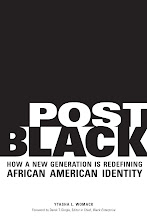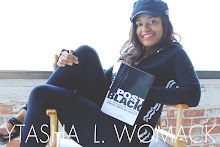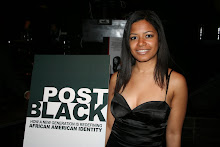
Laylah Barrayn is an award winning photographer, educator and curator. I first met Laylah when I interviewed her for Upscale Magazine where she discussed her critically acclaimed Dakar Series. Born and raised in Brooklyn, Barrayn's work has been showcased in galleries across the country including the Latin Collector Gallery, Museum of Contemporary Art in DC, and Danny Simmons' Corridor Gallery among others.
She was selected as one of the young photographers in “the Shootout' honoring civil rights photographer Jack T. Franklin at the African American Museum in Philadelphia. Her photography was also included in the photo anthology BLACK: A Celebration of Culture. A self taught photographer, she has studied at New York University and Universitie Cheikh Anta Diop in Senegal, West Africa.
YLW: Your latest exhibit Kindred Cool was featured at the Museum of Contemporary African Diaspora Arts (MoCADA) in Brooklyn. It's a jazz tribute and I read that you were inspired by Romare Bearden, Ralph Ellison and Albert Murray.
LB: I came up with the idea to document the jazz community. Not the musicians, but rather the fans or people who are documenting it in a different way . . .the jazz community in their entirety. I identified these people and I had them pick people who they bonded with through jazz or their jazz friends. I had them choose their location and integrated their words into the photograph. It was just very cooperative and inclusive. I used some professors, but I also used some old school jazz dudes who were at the club. So people saw people they knew on the walls of the museum. It helped them to see themselves in another light. Like, hey, I'm in a museum now or my friends are on the wall. That's what I'm always trying to do. I want them to feel the continuum that we're all on.
YLW: What new trends do you see among African American photographers?
LB: I've noticed that a lot of my friends who aren't documentarian photographers or traditional portrait photographers don't use the race theme in their work. They're conceptional. They're discussing politics, some of their own personal ideas about sexuality or self image. But when you see the work it doesn't remind you of something that's racialized. That's not the first concept that they want to include in their work.
YLW: Why not?
LB: They're trying to be just really out there and take their most abstract ideas and put them into photographs - not even traditional photographs, but different processes. They're being really inventive and novel. I see people being very individualized and conceptual.
YLW: How would you define your work?
LB: I would define my work as community oriented. Communal. Very integrated. Very inclusive. I would define my work as very jazz. As a photographer, I'm really composing. My subjects determine what my final outcome is going to be. It's encouraging to me. It's a way for me to let them express themselves.
YLW: Why does identity play such a major role in your work?
LB: I'm a teacher so I'm big on people defining themselves. I just like to use my camera to help people do that. I've done that for myself, for some of my earlier portraits when I used to travel globally. I really wanted to have my subjects define themselves in these portraits. I'm about empowering people to take that power back to believe that they can define themselves and be this independent person and not succumb to negativity.
YLW: How do you choose your subjects?
LB: I just capture people. When I'm on the street and I see someone and their energy is good, I want to capture them. I capture energy. I also like to capture people with different styles.
YLW: How do you define your spiritual practice?
LB: I would be the more orthodox Muslim, I've been with Warith Deen Mohammed (American Muslim Mission) for a long time. They really have this African American cultural Islamic thing going on. It's very American. It fuses American culture with Islamic practices and beliefs. If you go around the world with Islam, some of the culture is going to change because of the culture that you're in. A Senegalese Muslim is going to practice differently from a Muslim from Thailand. An American Muslim is going to remember when Marvin Gaye died but for a Muslim somewhere else, it might not be as significant.
YLW: You're an artist, a Muslim, and a self described eccentric. Do you interact with people who have difficulty accepting that?
LB: It's is so hard for so many people to understand someone like me. For example. I cover my hair. Sometimes I'm eccentric and it bothers people. I don't know why. Even during my first year of college, there was a woman, I guess she was Christian, and when I would walk in the room she would do the church clap. And she would yell, 'oh, thank you Jesus.' I thought she was crazy. She did not like people who did not think that Jesus Christ was the Lord and savior of everybody. She was from D.C, and there's really no excuse because that's a diverse city. Most African Americans are Christians. In D.C, you have people from the middle East, from Ethiopia. You see these people, so there should be some type of sense of comfort. You shouldn't be that bothered because you see someone different from me. Even the woman I 'm in this organization with who is a minister, she can't process me. She doesn't like me at all.
YLW: One of the reasons I wrote Post Black is because many people have a limited view of the diversity in African American culture.
LB: True. You can be gay and lesbian can be black. Being in a rock band is black. You can be black and not be a traditional Christian. At the same time, I get these flashbacks from college where I'm coming from Brooklyn and I'm going to this school. It's just weird. I went to Syracuse, a lot of people who came from Brooklyn were enjoying this multiracial environment for the first time, it's like the one's who came from Brooklyn, they don't come home anymore.
YLW: You can stretch beyond your boundaries and still have a respect for where you came from. How would you encourage those who are uncomfortable with the diversity in the black community to embrace it?
LB: I would just have people calm down. If people realize that everything is a continuum and that we are so much more alike that we don't have to be at odds. People don't need to be afraid. If we start defining ourselves more and take pride of who we say we are, we wouldn't be so afraid of other people.



No comments:
Post a Comment